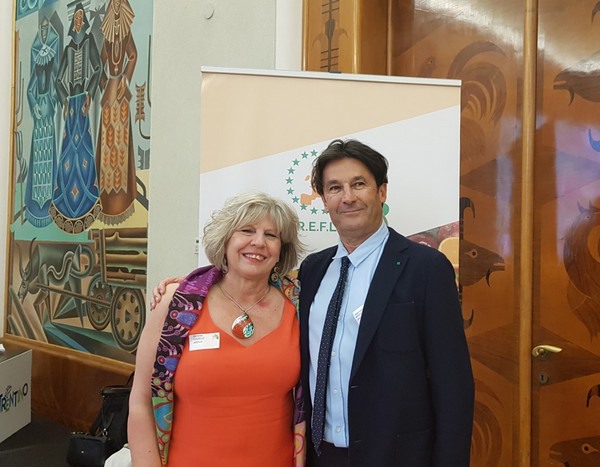As part of its General Assembly on June AREFLH organised on 16th June a public conference on the impacts of the geopolitical crisis and the climate emergency on the European fruit and vegetable sector, in Trento, Italy.
The event was co-organised by Assomela, the Italian association of apple producers, and hosted in the head quarters of the Autonomous province of Trento.

The final message of the AREFLH General Assembly has really been the importance and the power of aggregation in a highly complex context of food instability, war, its collateral effects, climate change and a post-pandemic situation. Vice-President Jean-Louis Moulon stated that such a strength is explained by the “carrefour of intelligences” and the diversity represented by the region members and producers.
The morning session of the General Assembly saw the reelection of Simona Caselli as President. This third election has deeply moved Mrs Caselli. She indeed has been actively involved in the AREFLH and the European agricultural sector for many years. She thanked the audience saying that she is honoured by the trust shown by the members.
Jean-Louis Moulon was also reelected as Vice-President for the third time, the president of French IDfel Val de Loire mentioned that during this third mandate he will “ask even more joint involvement within AREFLH, he will implement a gathering of competences which will serve the Farm to Fork Strategy”.
The afternoon session was, among other themes, dedicated to an exchange between the European institutions and the professionals of the sector. The involvement of the European Parliament and the European Commission was noteworthy; in a moment of intensive work they have shown a strong interest in participating to the conference. On this occasion, Herbert Dorfmann mentioned the letter co-signed by several MEPs asking the European Commission more flexibility in the management of resources allocated to POs and AOPs in order to overcome the difficulties that the fruit and vegetable market is currently going through. According to him, special attention must be paid in the EU policy so as not to compromise food security.
Other MEPs contributed to the event by video messages.
Then, from the European Commission, Celine Keidel (DG AGRI), Luc Berlottier (DG AGRI), María Pilar Aguar Fernández (DG SANTE) were present and discussed the upcoming regulatory developments regarding sectoral interventions for F&V, as well as the Directive on the sustainable use of pesticides.
During the conference, Claudio Scalise from SG Marketing, gave a microeconomic overview of the current fruit and vegetable market situation. The first important point is the distress of the European production, above all for the fruit: peaches, nectarines, pears. The apple and kiwi productions are also suffering, however, of a smaller decrease. Regarding vegetables, the tomato production is also falling. M. Scalise noted that it is particularly due to the lack of innovation, and the fact that such products are less in line with the market demands.
The second point is the fact that the market is polarized, with low-price products that increase, due the war, yet, this range do not bring income to the producers. The range that interest more the consumer are the ones related to sustainability, organic production, health or the vegan trend. As a consequence, the products mostly sought for are legumes, dried fruits. They are thus giving growing opportunities to the sector.
Luc Vanoirbeek, president of the F&V working group of COPA-COGECA reacted to this presentation adding that “the situation is becoming more and more difficult for the producers. Dropping prices, competition, increasing costs place F&V companies under a strong pressure. The sector is resilient, it will survive, however producers need a regulation framework with a European Commission that thoroughly comprehends the sector when new measures are being set up.”
The second day of General Assembly was dedicated to technical visits. AREFLH members visited VOG products, one of the biggest fruit processing industry in Europe and Melinda’s unique underground warehouses.
AREFLH network of regions and POs/APOs continues to expand; the General Assembly validated two more national organisations as associated members: Abricots et Pêches de France and the Association Nationale Pommes et Poires (ANPP) .
The conference can be watched again on AREFLH YouTube channel (starting at 36:40).
For more information:
Laetitia Forget
AREFLH
Tel: +33(0)5 33 89 10 19
www.areflh.org
AREFLH (Assembly of European Horticultural Regions) main missions are:
to represent its 16 member regions, its 39 POs/APOs, from 10 countries in Europe;
to defend the economic and social interests of the fruit, vegetable and flowers sectors in Europe;
to foster exchanges of best practices, partnerships and joint projects between regions and professional organisations;
to actively seek new solutions for the main issues affecting the future of the F&V production in Europe.
